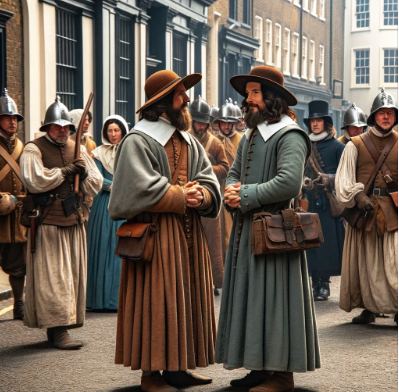Stand with me, if you will, on the precipice of history. We continue on a journey from the Magna Carta, sealed in 1215, to the birth of the American Constitution in 1787 – a tale that weaves through centuries, continents, and revolutions in thought. So far, we have been witnesses to the signing of the Magna Carta on the Meadow at Runnymede, the Puritan’s journey to the New World and the signing of the Mayflower Compact. But there is more to see, more to know, and more from which to grow our individual liberties and freedoms forming a Democratic Republic aka our Constitution and Bill of Rights.

Picture the Magna Carta as our starting point, a beacon of rights against monarchical power. Fast forward to the 16th century, and witness the Protestant Reformation, a seismic shift in religious thought. Amidst this backdrop, Puritans, yearning for religious freedom, embarked on a perilous journey to America in 1620, planting the seeds of self-governance with the Mayflower Compact and celebrating the first Thanksgiving. These acts weren’t mere historical footnotes; they were the early whispers of democracy and consent of the governed.
Now, cast your gaze back to England in 1670, where the stage is set for two landmark trials that would cement the very essence of freedom. First, the trial of William Penn, a Quaker. Here, we see a judge, a symbol of authority, desperately trying to bend the jury to his will. His instructions were clear: find Penn guilty. But the jury, led by the steadfast Edward Bushell, defied these orders, standing tall for truth and justice. Their ‘not guilty’ verdict was a thunderous declaration of independence from judicial tyranny.
The aftermath was fraught with drama. The same judge, incensed by their defiance, imprisons the jurors. Yet, in these dark hours, a spark of hope flickers. Ordinary citizens, witnessing this injustice, band together, ferrying food across the street to the jailed jurors in 1670. This act of solidarity was more than charity; it was a public testament to the power of collective conscience.
Edward Bushell’s relentless pursuit for justice leads us to a courtroom where the rule of law triumphs. His appeal culminates in the historic Bushell’s Case ruling of 1670, affirming that jurors cannot be punished for their verdicts. This decision didn’t just free a man; it liberated a fundamental principle of justice.
Now, let’s connect these historic dots. William Penn’s trial and the subsequent Bushell’s Case were far more than isolated incidents. They were the catalysts in a global evolution of rights and governance. Their impact resonated across the Atlantic, influencing the nascent American Constitution and shaping the very bedrock of modern democracies.
These trials underscored the sanctity of religious freedom, the right to assemble, and the inviolability of a fair trial. They laid the groundwork for the principles of liberty and self-governance, echoing the Puritans’ earlier pursuit of religious freedom in the early 17th century.
In every corner of history where freedom was fought for and won, from the sealing of the Magna Carta in 1215 to the drafting of the American Constitution in 1787, the echoes of Penn’s and Bushell’s defiance resound. It’s a testament to the enduring power of individual courage in the face of overwhelming authority. These events are not mere historical accounts; they are the pillars upon which modern constitutional law stands, a constant reminder of the importance of safeguarding individual rights against the excesses of state power.”
Generated with AI assistance.